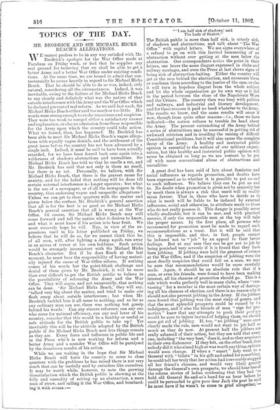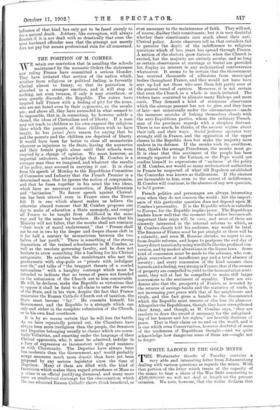TOPICS OF THE DAY.
MR. BRODRICK AND SIR MICHAEL HICKS BEACH'S ALLEGATIONS.
WE cannot profess to be in any way satisfied with Mr. Brodrick's apologia for the War Office made at Farnham on Friday week, or feel that he supplies any real ground for believing that we shall be able, to get a better Army and a better War Office under existing condi- tions. At the same time, we are bound to admit that con- troversially he scores heavily in regard to Sir Michael Hicks Beach. That he should be able to do so was, indeed, only natural, considering all the circumstances. Indeed, it was inevitable, owing to the failure of Sir Michael Hicks Beach to say clearly and definitely what was the nature of that outside interference with the Army and the War Office which he declared prevented real reform. As we said last week, Sir Michael Hicks Beach either said too much or too little. His words were strong enough to evoke uneasiness and suspicion.
They were too weak to compel either a satisfactory answer and explanation, or else an admission from those responsible for the Army upon which the country could take action. What we feared, then, has happened. Mr. Brodrick has been able to meet Sir Michael Hicks Beach's vague allega- tions with equally vague denials, and the settlement of the great issue before the country has not been advanced by a single inch. Indeed, it must be said to have been actually retarded, for we have been forced back once again into a wilderness of shadowy abstractions and unrealities. Sir Michael Hicks Beach has told us that he smells a rat, and Mr. Brodrick has said that not only is there no smell, but there is no rat. Personally, we believe, with Sir Michael Hicks Beach, that there is the gravest cause for anxiety, and for the belief that nothing will be done till certain external interference no longer operates ; but what is the use of a. newspaper, or of all the newspapers in the country, thus endorsing vague and unspecific allegations ? Unless we can get to close quarters with the matter and pierce below the surface, Mr. Brodrick's general assertion that all is for the best is as good as Sir Michael Hicks Beach's general assertion that all is wrong at the War Office. Of course, Sir Michael Hicks Beach may still come forward and tell the nation what it desires to know, and what it must know if his action is to bear fruit. We most sincerely hope be will. Nay, in view of the ex- pressions used in his letter published on Friday, we believe that he will do so, for we cannot think that he, of all men, will, after lighting a damp squib, run away in an access of terror at his own boldness. Such action would be strangely inconsistent with Sir Michael Hicks Beach's character. But if he does flinch at the last moment, he must bear the responsibility of having materi- ally injured the cause of War Office reform. If nothing comes of his words but the point-blank challenge and denial of them given by Mr. Brodrick, it will be more than ever difficult to get the British public to believe in the possibilitity of reforming the Army and the War Office. They will argue, and not unnaturally, that nothing can be done. Sir Michael Hicks Beach,' they will say, talked very big about the matter, and tried to make our flesh creep about outside interference ; but when Mr. Brodrick tackled him it all came to nothing, and as far as any ordinary man can see, there was nothing but gossip behind his words.' Can any sincere reformer, can any one who cares for national efficiency, can any real lover of his country, considerlhat this would be a healthy or useful or safe attitude for the British public to take up ? Yet inevitably this will be the attitude adopted by the British public if Sir Michael Hicks Beach now lets things remain as they are. Every force and influence in public life and in the Press whi..h is now working for reform and a better Army and a sounder War Office will be paralysed by the disastrous results of his action.
While we are waiting in the hope that Sir Michael Hicks Beach will force the country to come to close quarters with the problems he has raised there is not very much that can be usefully said by outsiders like ourselves. It may be worth while, however, to note the growing dissatisfaction which the British .public is showing at the folly and unreality of setting up an abstraction, a mere man of straw, and calling it the War Office, and bombard- ing it with stones
" I am half sick of shadows,' said The Lady of Shalott."
The British public is more than half sick, is utterly sick, of shadows and abstractions, and talk about "The War Office" with capital letters. We see signs everywhere of a refusal to go on with this farcical hammering of an abstraction without ever getting at the men below the abstraction. Our correspondents notice the point in their letters, one hears the same disgust expressed in clubs and railway carriages, and even the Press at last shows signs of being sick of abstraction-baiting. Either the country will get at the men behind the abstraction, and exonerate them or condemn them according to the justice of the case, or else it will turn in hopeless disgust from the whole subject and let the whole organisation go its own way as it did in the period between the close of the Napoleonic Wars and the Crimea. The country then was busy with politics and railways, and industrial and literary development, and for these reasons it paid no heed whatever to the Army. The results we know, and the same results will occur if now, though from quite other reasons—i.e., those we have indicated—the nation refuses to trouble its head about the Army. The present entrenching of the Army behind a series of abstractions may be successful in getting rid of awkward criticism and in avoiding the raising of difficult Constitutional problems, but it will also cause the complete decay of the Army. A healthy and instructed public opinion is essential to the welfare of our military organi- sation, but this healthy and instructed public opinion will never be obtained as long as we are content to be put off with mere conventional abuse of abstractions and unrealities.
A great deal has been said of Late about feminine and social influences as regards promotion, and doubts have been expressed as to whether it is possible to put an end to such influences. We believe they can be put an end to. No doubt when promotion is given not by seniority but by merit there is always a risk that merit will in reality mean favour. That is, those who have to decide as to what is merit will be liable to be induced by external influences, social and otherwise, to attribute merit to those who do not really possess it. This danger is possibly never wholly eradicable, but it can be met, and with practical success, if only the responsible men at the top will take the proper means. In the first place, all persons who recommend for promotion must be made to regard such recommendations as a trust. But it will be said that this is impossible, and that, in fact, people cannot be induced not to " job " by an appeal to their better feelings. But at any rate they can be got not to job by being punished very severely if it is found that they have been jobbing. If jobbing were held the greatest of crimes at the War Office, and if the suspicion of jobbing were the most deadly suspicion that could fall on a man, we may be sure that recommendations would be more carefully made. Again, it should be an absolute rule that if a man, or even his friends, were found to have been making interest, all his chances of promotion should go. This is a rule which works perfectly well in many clubs, where can- vassing" for a member is the most certain way of destroy- ing all his chances of election, and there is no reason why it should not also prevent jobbing in the Army. If the jobbers once found that jobbing was the most risky of games, and that the most splendid prospects could be ruined by its indulgence, and if also the friends of men "ripe for pro; motion " knew that any attempts to push their proteges would be sure to injure instead of helping them, we should soon get rid of jobbing. If, too, "no jobbing" were once clearly made the rule, men would not want to job half so much as they do now. At present half the jobbers are really ashamed of their action, but they are told that every one, including" the very best," does it, and so they acquiesce in their own dishonour. If they felt, on the other hand, that nobody did it who aimed high or was worth anything, opinion would soon change. If when a " smart " lady went to a General with " billets " in his gift and asked for something, he could tell her truly that her action had irrevocably stopped all her friend's chances, and would very likely greatly damage the General's own prospects, we should hear less of the odious stories of ladies confessing that they had to hold old General So-and-so's hand for an hour before he could be persuaded to give poor dear Jack the post he said he must have if he wasn't to come to grief altogether, — influence of that kind has only got to be faced sternly to die a natural death. Jobbery, like corruption, will always flourish if it is not dealt with so drastically that even the most hardened offender sees that the attempt not merely does not pay but means professional ruin for all concerned.











































 Previous page
Previous page